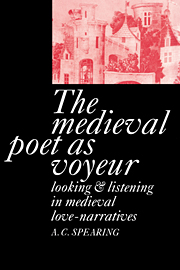Book contents
- Frontmatter
- Contents
- Preface
- 1 Theories of looking
- 2 Examples of looking
- 3 The Tristan story
- 4 Chrétien de Troyes
- 5 The Lanval story
- 6 Troilus and Criseyde and The Manciple's Tale
- 7 Partonope of Blois
- 8 The Knight's Tale and The Merchant's Tale
- 9 The Squyr of Lowe Degre
- 10 The Romaunt of the Rose
- 11 The Parliament of Fowls and A Complaynt of a Loveres Lyfe
- 12 The Palice of Honour and The Goldyn Targe
- 13 The Tretis of the Twa Mariit Wemen and the Wedo
- 14 Phyllyp Sparowe
- Notes
- Bibliography
- Index
13 - The Tretis of the Twa Mariit Wemen and the Wedo
Published online by Cambridge University Press: 20 August 2009
- Frontmatter
- Contents
- Preface
- 1 Theories of looking
- 2 Examples of looking
- 3 The Tristan story
- 4 Chrétien de Troyes
- 5 The Lanval story
- 6 Troilus and Criseyde and The Manciple's Tale
- 7 Partonope of Blois
- 8 The Knight's Tale and The Merchant's Tale
- 9 The Squyr of Lowe Degre
- 10 The Romaunt of the Rose
- 11 The Parliament of Fowls and A Complaynt of a Loveres Lyfe
- 12 The Palice of Honour and The Goldyn Targe
- 13 The Tretis of the Twa Mariit Wemen and the Wedo
- 14 Phyllyp Sparowe
- Notes
- Bibliography
- Index
Summary
The Tretis of the Twa Mariit Wemen and the Wedo, ‘Dunbar's longest and most ambitious poem’, is another first-person narrative in which a male observer secretly watches and listens to women. Unlike the speakers of The Palice of Honour and The Goldyn Targe, though, he is not dreaming and he is not dragged out of hiding to be looked at himself and to suffer female aggression. What happens is simple: out alone after midnight on Midsummer Eve, he comes upon three splendidly dressed ladies sitting drinking in a garden; he conceals himself to listen to their conversation, and finds himself hearing scurrilous accounts of their marriages. Two are wives and one a widow: the widow invites her companions to disclose their experiences and views of marriage, and they do so, each of their speeches being followed by laughter and more drinking; then the widow, at more than twice the length and scurrility, relates her dealings with her two husbands and her subsequent conduct. By the time they finish dawn is breaking, and Dunbar creeps away undiscovered, to ask his ‘auditoris most honorable’ (527) which lady they would choose to marry. Most of the poem's narrative material is doubly framed, ‘autobiographical’ stories told by the women and then retold by the man who overhears them; its meaning lies not in any allegorical action but in the rhetorical force of its language; and this means not only its force for us, but whatever we may imagine it to be for the listener in the poem, the voyeur-poet who discovers – or fantasizes that he discovers – what women say about men in men's absence.
- Type
- Chapter
- Information
- The Medieval Poet as Voyeur , pp. 249 - 267Publisher: Cambridge University PressPrint publication year: 1993



